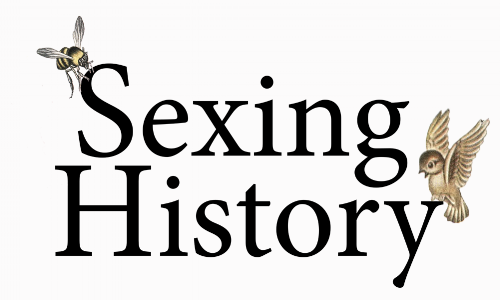Gillian Frank and Lauren Gutterman, "How the 'Girl Watching' Fad of the 1960s Taught Men to Harass Women"
”The girl watching phenomenon gained steam in the 1950s and 1960s at a moment when men openly embraced “picking up” women for casual sex before marriage. Over time, girl watching became a staple of mainstream and adult men’s magazines. Girl watching guides and girl watching clubs of the midcentury (alongside cartoons and advertisements) taught American men how to sexualize and harass women on the street, among other public places.”
Eliza Relman, "Amy Coney Barrett Uses the Offensive Term 'Sexual Preference' to Refer to LGBTQ People"
"At her Senate confirmation hearing, the Supreme Court nominee Judge Amy Coney Barrett used the widely denounced term "sexual preference" to refer to LGBTQ Americans' sexual orientations. Barrett refused to say whether she agreed with the landmark 2015 Supreme Court ruling that same-sex marriage is a constitutionally protected right.”
Kate Sosin, “Amy Coney Barrett Has Ties To an Anti-LGBTQ Hate Group"
”Supreme Court nominee Amy Coney Barrett is being asked to answer for her ties to the Alliance Defending Freedom, a far-right legal organization that has been at the forefront of the fight against legal cases for LGBTQ+ equality in the United States.”
Adam Liptak, “Justices Thomas and Alito Question Same-Sex Marriage Precedent"
”Justices Clarence Thomas and Samuel A. Alito Jr., who dissented from the Supreme Court’s 2015 decision establishing a constitutional right to same-sex marriage, urged the court on 5 October to reconsider the ruling”
James Esseks, "The Next Big Case on LGBTQ Rights is Already Before the Supreme Court"
”In Fulton v. Philadelphia, the court could create a precedent that allows discrimination against LGBTQ families. More specifically, private agencies that receive taxpayer funding to provide government services — such as foster care agencies, food banks and homeless shelters — could be given a constitutional right to deny services not just to people who are LGBTQ, but even to religious groups, such as Jews, Muslims or Mormons.”
Oleksiy Kuzmenk, Michael Colborne, and Aiganysh Aidarbekova, “How American Religious Conservatives Fought LGBT Rights in Ukraine"
”An investigation by “Bellingcat Anti-Equality Monitoring” suggests that Steve Weber, longtime head of the Ukrainian branch of the Christian Broadcasting Network, a US media juggernaut, initiated the creation of the “Alliance Ukraine for Family”, a “pro-family” umbrella organisation whose members run nationwide anti-LGBT campaigns and oppose anti-discriminatory changes to laws.”
Clea Simon, “A Global Look at How COVID-19 Has Affected LGBTQ Activism"
”The COVID-19 pandemic has impacted virtually every aspect of life, including global social movements such as the struggle for LGBTQ rights."
Suyin Haynes, "Why a Children's Book is Becoming a Symbol of Resistance in Hungary’s Fight Over LGBT Rights"
”Published on 21 September 2020, Meseorszag mindenkie, or A Fairy Tale for Everyone, is an anthology of retellings of traditional fairy tales, updated with more diverse, inclusive and LGBTQ characters in contemporary settings. Shortly after its release, A Fairy Tale for Everyone became the target of homophobic attacks by politicians, including the Hungarian Prime Minister Viktor Orban, and is facing a public boycott.”
Article Spotlight
Rosalind Eyben, ‘The Moustache Makes Him More of a Man’: Waiters’ Masculinity Struggles, 1890–1910, History Workshop Journal, Volume 87, Spring 2019, Pages 188–210, https://doi.org/10.1093/hwj/dbz008
When moustaches were at the height of European fashion among men of all classes, why did luxury restaurants require their waiters to be clean-shaven and why did some waiters object? The article draws primarily on the contemporary press to examine the ambivalent gender and class position of waiters who did a ‘woman’s job’ and dressed like a gentleman to perform extreme subservience for rich men’s enjoyment. The moustache ban was an exercise of power over the waiter beyond the workplace into other domains. It embodied the innate subservience of the domestic servant and reinforced the perception of the public, including fellow trade unionists, that waiters were emasculated feudal retainers rather than manly men earning their living in the modern market place. Waiters were the butt of jokes. In Britain, the Trades Union Congress laughed at their union’s claims to the moustache and finally in 1899 told them to stay away. Waiters’ servile direct dependence on the wealthy was a threat to a working-class masculinity of independence and hard physical work. As the waiters’ leader well understood, their lack of moustache served to confirm the general perception that waiters were neither real workers nor real men.
Episode Spotlight
In the 1980s and 1990s, the San Francisco Metropolitan Community Church wrestled with profound questions: What does it mean to minister a gay church when so many in the congregation are dying from AIDS-related complications and grieving the recently dead? How do you have faith during an epidemic? And what does it mean to participate in communion in a community ravaged by a plague?
For more, listen here.
Books
Upcoming Events
Contagions of Empire: A Conversation With Professor Khary Polk, 8 November 2020
"An author discussion with Professor Khary Polk about his recently published book, Contagions of Empire.
Contagions of Empire: Scientific Racism, Sexuality, and Black Military Workers Abroad, 1898-1948 (University of North Carolina Press, June 2020) examines how the movement of Black soldiers and nurses around the world in the early-to-mid twentieth century challenged U.S. military ideals of race, nation, and honor.”
Rachel Hope Cleves in Conversation with Alexis Coe, 17 November 2020
”Rachel Hope Cleves, author of Unspeakable: A Life beyond Sexual Morality, in conversation with Alexis Coe, author of You Never Forget Your First: A Biography of George Washington.
Unspeakable is the clear-eyed biography of Norman Douglas, a once beloved, now largely forgotten author—and an unrepentant and uncloseted pederast. Rachel Hope Cleves’s careful study of Douglas’s life opens a window onto the social history of intergenerational sex in the nineteenth and twentieth centuries, revealing how charisma, celebrity, and contemporary standards protected Douglas from punishment—until they didn’t.”
Race, Sex, and Disease in the Early Caribbean: Yaws and Syphillis, UCL Institute of the Americas, 18 November 2020
”Dr Katherine Paugh of Oxford University will discuss the story of syphilis in the early Caribbean, focusing on how Britons and West Africans who were caught up in the Atlantic slave trade and new world slavery understood syphilis. ”








